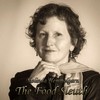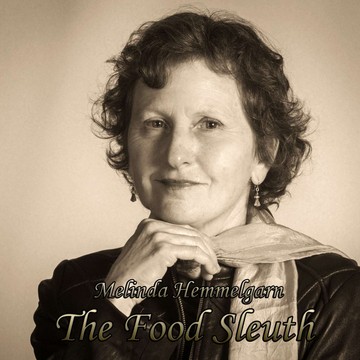

Food Sleuth Radio
Melinda Hemmelgarn
Dietitian Melinda Hemmelgarn helps listeners “think beyond their plates,” connect the dots between food, health and agriculture, and find food truth.
Episodes
Mentioned books

Dec 6, 2024 • 28min
Abby Youngblood, Executive Director of the National Organic Coalition discusses climate benefits and policy challenges of organic farming.
Did you know that organic farming is climate-smart agriculture? Join Food Sleuth Radio host and Registered Dietitian, Melinda Hemmelgarn, for her conversation with Abby Youngblood, Executive Director of the National Organic Coalition. Youngblood discusses the multiple benefits of organic food and farming, plus the potential challenges and policy advocacy opportunities related to the Farm Bill, and incoming Presidential administration.Related Websites: www.nationalorganiccoalition.org

Nov 29, 2024 • 28min
Marita Canedo, Milk with Dignity Program Coordinator for Migrant Justice
Did you know that 50 percent of all food produced in the United States is handled at some point by migrant farm workers? Join Food Sleuth Radio host and Registered Dietitian, Melinda Hemmelgarn for her conversation with Marita Canedo, coordinator of the Milk with Dignity Program for Migrant Justice, a Vermont-based advocacy organization with a mission to empower the immigrant farm worker community and organize for economic justice and human rights. Canedo will discuss the exploitation of immigrant dairy farm workers and routes to empowerment and justice – through solidarity, not charity.Related Websites: Silenced Voices: https://migrantjustice.net/videos Migrant Justice: https://migrantjustice.net/about Milk with Dignity: https://migrantjustice.net/milk-with-dignity-campaign

Nov 22, 2024 • 28min
Rebecca Raney, journalist at U.S. Right to Know, discusses neonicotinoids
Did you know that nearly all non-organic, commercially grown corn and approximately half of soybeans, cotton and wheat seeds are treated with neonicotinoid pesticides? Join Food Sleuth Radio host and Registered Dietitian, Melinda Hemmelgarn for her conversation with Rebecca Raney, investigative journalist at U.S. Right to Know. Raney discusses her series of articles on neonicotinoids, a class of systemic neurotoxic insecticides tied to bee and other pollinator deaths (as well as harm to soil and human health), and how pesticide companies shape bee research agendas and manage public perceptions to deflect attention away from neonicotinoids as a driver of the current bee crisis. Related Websites: https://usrtk.org/category/bees-neonics/ Tracking the Pesticide Industry Propaganda Network: https://usrtk.org/pesticides/tracking-the-agrichemical-industry-propaganda-network/ Birds and Bees Protection Act: https://www.governor.ny.gov/news/governor-hochul-signs-birds-and-bees-act-nation-leading-legislation-protect-new-yorkers-and

Nov 15, 2024 • 28min
Mark Vossler, M.D., discusses the health harms from gas stoves
Did you know that gas stoves pose health hazards, especially to vulnerable populations? Join Food Sleuth Radio host and Registered Dietitian, Melinda Hemmelgarn for her conversation with Mark Vossler, M.D., cardiologist, and President-elect of Physicians for Social Responsibility. Vossler discusses the unhealthy air pollution from gas stoves, related health risks, including causing and exacerbating asthma, vulnerable populations, and ways to mitigate risks. Related Websites: Rewiring America: https://www.rewiringamerica.org/ Gas Stove Pollution Fact Sheet: https://psr.org/resources/gas-stove-pollution-fact-sheet/

Nov 8, 2024 • 28min
Molly Nicholie, Executive Director, Appalachian Sustainable Agriculture Project discusses Hurricane Helene.
Did you know that in September, the Appalachian region was surprisingly hit by Hurricane Helene which destroyed mountain communities and farms, disrupted their water infrastructure, and impact their tightly-knit, well-connected regional food system. Join Food Sleuth Radio host and Registered Dietitian, Melinda Hemmelgarn for her conversation with Molly Nicholie, Executive Director of the Appalachian Sustainable Agriculture Project. Nicholi will discuss the impact of Hurricane Helene on the region’s food system, as well as recovery efforts.Related Websites: asapconnections.org

Nov 1, 2024 • 28min
Marianne Krasny, Ph.D., author of In This Together: Connecting with your Community to Combat the Climate Crisis
Did you know that community networking is key to taking steps toward mitigating climate change? Join Food Sleuth Radio host and Registered Dietitian, Melinda Hemmelgarn for her conversation with Marianne Krasny, Ph.D., Professor and Director of the Civic Ecology Lab at Cornell University and author of In This Together: Connecting with your Community to Combat the Climate Crisis. Krasny explains “network climate action” - the power of our social networks in making collective lifestyle changes and instituting policies for mitigating climate change.Related Websites: https://cals.cornell.edu/marianne-elizabeth-krasny webinar series: https://www.civicecology.org/prd

Oct 25, 2024 • 28min
Alexis E. Racelis, PhD, discusses the climate change, agriculture, and agroecology
Did you know that agroecology offers a holistic approach to agriculture? Join Food Sleuth Radio host and Registered Dietitian, Melinda Hemmelgarn, for her conversation with Alexis E. Racelis, PhD, Professor of Agroecology at the University of Texas Rio Grande Valley. Racelis discusses the impact of climate change on agriculture in his unique geographical region in south Texas, and the potential benefits of agroecology and regionalized food systems.Related Websites: https://www.rgvagroecology.com/ “Planet Hunger: Inside the Global Food Crisis,” by Jeff Goodell: https://www.rollingstone.com/politics/politics-features/ukraine-food-crisis-1367826/ TX sugar mill closure: https://www.youtube.com/watch?v=gMXbebDCnQw

Oct 18, 2024 • 28min
Don Schaffner, PhD, food microbiologist, Rutgers University (Part 2)
Did you know there are probably millions of cases of foodborne illness every year in the U.S.? Join Food Sleuth Radio host and Registered Dietitian, Melinda Hemmelgarn, for her conversation with Don Schaffner, PhD, food microbiologist, Distinguished professor, and Extension Specialist at Rutgers University. Schaffner discusses Covid -19 and food’s unlikely route of Covid exposure, handwashing specifics (time and water temp.), and specific foods he avoids and why. (part 2 of 2)Related Websites: https://www.riskyornot.co/ - Eating expired baby carrots: https://www.riskyornot.co/episodes/625-eating-expired-baby-carrots http://foodsafetytalk.com/

Oct 11, 2024 • 28min
Don Schaffner, PhD, food microbiologist, Rutgers University (Part 1)
Did you know that pregnant women should avoid deli lunch meats due to the risk of listeria-related foodborne illness? Join Food Sleuth Radio host and Registered Dietitian, Melinda Hemmelgarn for her conversation with Don Schaffner, PhD, food microbiologist, Distinguished Professor, and Extension Specialist at Rutgers University. Schaffner discusses his research on handwashing, characteristics of listeria and the recent Boar’s Head lunch meat recall, and food safety related to power outages. (Part 1 of 2)Related Websites: https://www.riskyornot.co/ Historical perspectives on handwashing: https://www.ncbi.nlm.nih.gov/books/NBK144018/ Boar’s Head meat recall CDC updates: https://www.cdc.gov/media/releases/2024/s0828-listeria-outbreak-deli-meats.html

Oct 4, 2024 • 28min
Max Goldberg, MBA, Founder and Editor of the Organic Insider newsletter.
Did you know that there are efforts to weaken the organic label? Join Food Sleuth Radio host and Registered Dietitian, Melinda Hemmelgarn for her conversation with Max Goldberg, MBA, Founder and Editor of Organic Insider newsletter covering the organic industry, and administrator of the Organic Food Industry group on LinkedIn. Goldberg discusses gene editing, regenerative agriculture, and food labels consumers can trust.Related Websites: www.organicinsider.com


